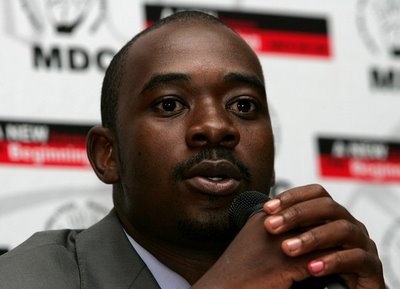


 THE Movement for Democratic Change (MDC-T)’s primary elections across the country have so far left 15 legislators facing the chop while more are expected to fall by the wayside against the backdrop of discontent over the performance of some sitting Members of Parliament.
THE Movement for Democratic Change (MDC-T)’s primary elections across the country have so far left 15 legislators facing the chop while more are expected to fall by the wayside against the backdrop of discontent over the performance of some sitting Members of Parliament.
Some legislators in Prime Minister Morgan Tsvangirai’s party have been labelled fortune-seekers bent on lining their pockets while the proverbial Rome is on fire.
Late last year, the party launched a countrywide corruption probe to weed out those fingered in dirty deals, but nothing much came out of it. While some councillors were fired from the party on graft allegations, the MDC-T did not go the extra mile to haul them before the courts.
Even some delegates at the party’s policy conference two weeks ago warned the party leadership to act on corruption within its rank and file or face the wrath of voters.
So far, the 15 who are facing the axe are from Harare, Bulawayo and Chitungwiza and expectations are that by the time the exercise ends next weekend, more would have been shown the exit door.
The party’s rules dictate that sitting legislators have to go through a confirmation process by their constituencies.
Legislators who secure a two thirds majority of the people’s votes would automatically represent the party in the forthcoming elections. Where the MDC-T has no sitting MPs, primary elections are held with no confirmation process.
A sitting MP’s failure to get confirmed by the electorate is seen as a vote of no confidence and officials in the party’s commissariat say it would be difficult for such legislators to stage a comeback in primary elections.
The primaries, which started last weekend, kicked off with a round of internal confirmations; a number of senior and two-term parliamentarians have been knocked out of the race.
Fidelis Mhashu, a former cabinet minister, and Misheck Shoko, the former Mayor of Chitungwiza, were among high profile casualties who failed to get enough votes to avoid going to the primaries.
Others big names who suffered huge setbacks include Science and Technology Minister and Budiriro MP Heneri Dzinotyiwei, Kambuzuma legislator, Willas Madzimure, who is the chairperson of the African Parliamentarians Network against Corrup-tion.
The party’s national organising secretary Nelson Chamisa told The Financial Gazette yesterday that while confirmation and primary elections were happening concurrently, it is still too early to say some of the bigwigs such as Mhashu and Shoko who failed to get confirmed, would not survive the primaries.
In St Mary’s, incumbent MP Marvellous Khumalo only managed to garner 30 votes, while 330 were against him while Collen Gwiyo of Zengeza West and Edward Musumbu of Norton also failed the confirmation test.
Others are Elias Jembere (Epworth), Pearson Mungofa (Highfields East), Simon Hove (Highfield West), Margaret Matienga (Sunningdale), and Gift Dzirutwe (Glen Norah).
“We wait to see if these guys will survive from the setbacks they have suffered at the confirmation stage. But this goes to show that the race to represent the party at elections is very tight,” said Chamisa.
Asked whether the party leadership is happy with the calibre of candidates making it through the primary elections, Chamisa said: “The MDC is producing superstar candidates, candidates of note, veteran trade unionists, teachers, business people and popular personalities such as James Maridadi and Eric Knight.”
He said the primary elections were being conducted peacefully and orderly with no cases of violence cited.
For each constituency there is a voters’ roll prepared by the party’s election directorate and the voters are using transparent boxes.
“Things are flowing, the process is clean and those who did not make it understand that it is not because of the process but their shortcomings,” he said.
Political analyst Gideon Chitanga, believes that the MDC-T has proved to be a democratic party but needs to deal with electoral complains satisfactorily.
“Looked at in the context of African political parties which usually impose candidates on the electorate, the primary elections have shown that the party is very democratic, has gained in its strength and popularity. Its mechanisms to deal with internal conflict are gaining in strength. However, there is need to deal with complains in a satisfactory manner that will allow the party to heal from minimal divisions emanating from electoral competition, thus ensuring unity as the party heads towards watershed national elections. Political transparency should embrace political competition at the highest level without fear or favour. Thus top leaders should therefore accept to be contested; this is not enmity but democracy at its best,” said Chitanga.